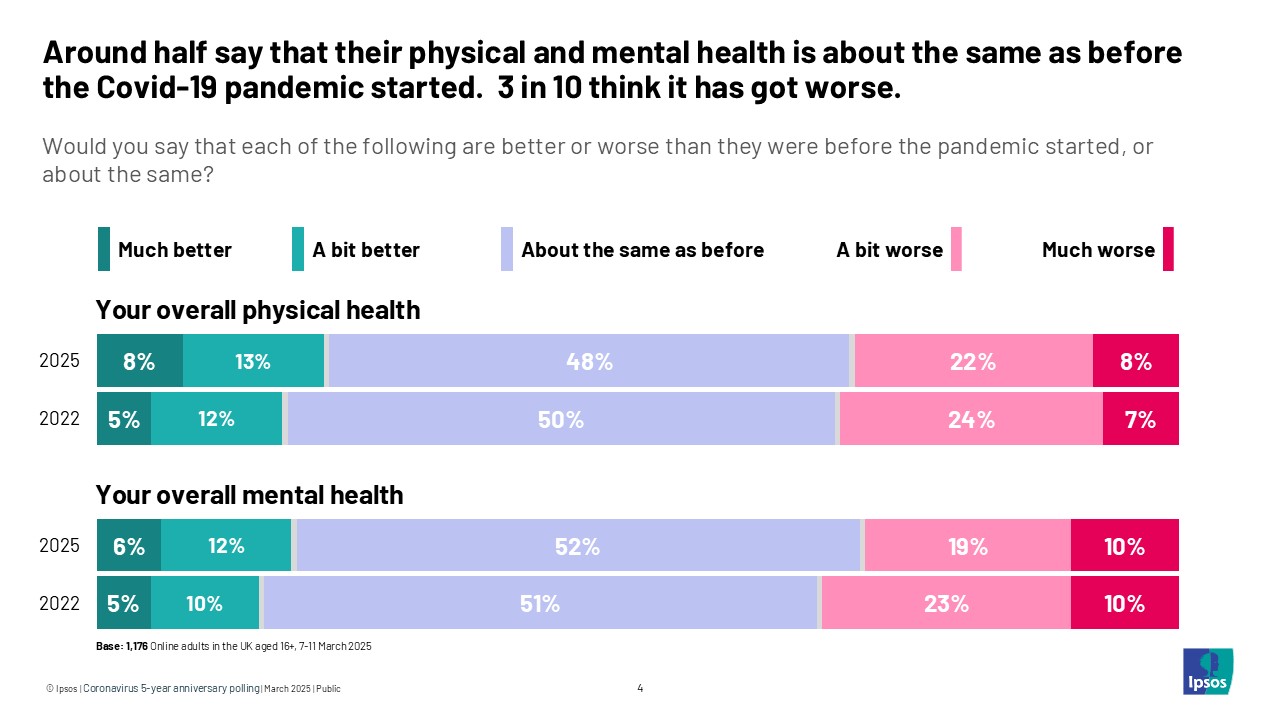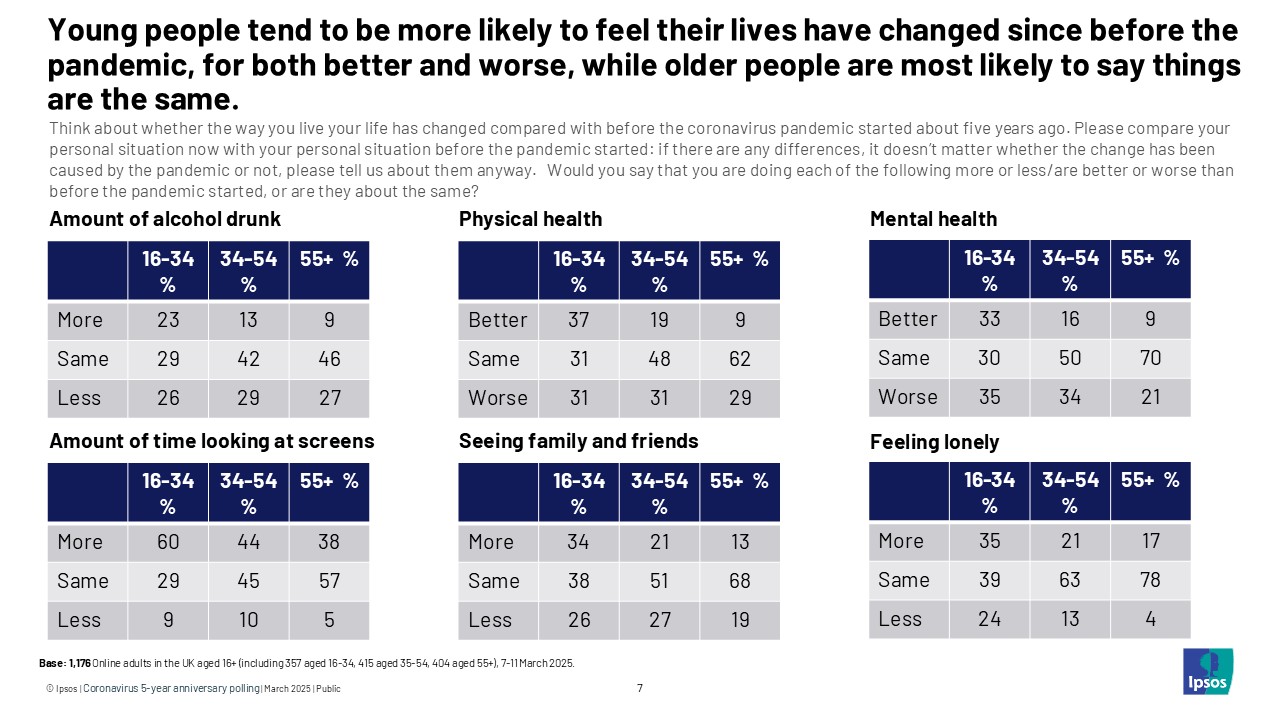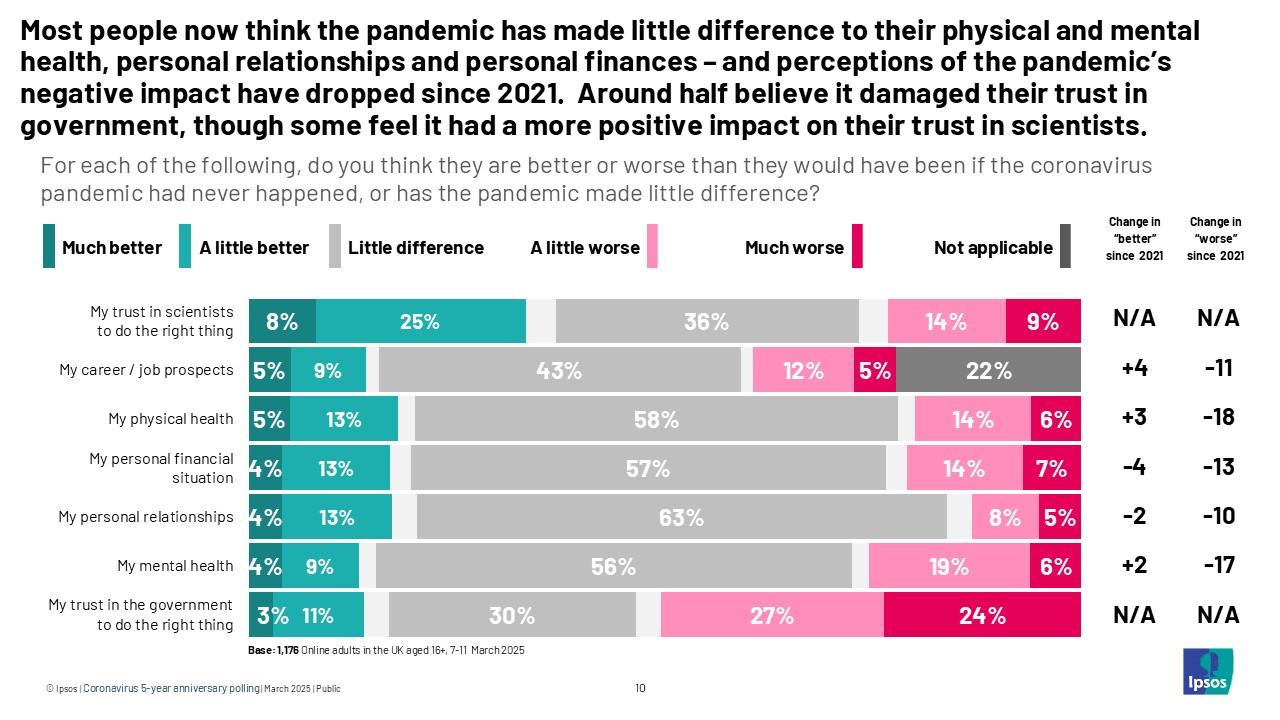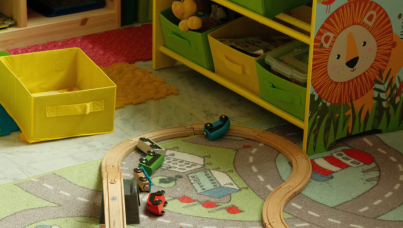COVID-19 five years on: Young people most likely to say they’re lonelier and spending more time looking at screens than before the pandemic
New polling from Ipsos UK explores how the lives of the UK public have changed since the COVID-19 pandemic, five years after the UK’s lockdown was first announced.
The research reveals a stark generational divide, with younger people more likely to say their lives have changed both for better and worse since before the pandemic, while older generations are more likely to say things are the same. 18-to-34-year olds are twice (35%) as likely to say they are lonelier since before the pandemic, compared to over 55s (17%).
At the same time young people are also more likely than older generations to say they feel less lonely, by a margin of 24% to 4%, while 78% of over 55s say their loneliness levels are the same as before the pandemic started. The middle aged are also as likely as younger people to have felt the negative impact of the pandemic on their personal finances and physical and mental health, but less likely to have seen any upsides.
More broadly, nearly half of UK adults (46%) believe the COVID-19 pandemic changed the world for the worse, highlighting the enduring societal impact of the crisis.
Key findings
- Pandemic's legacy - change for the worse? Nearly half of UK adults (46%) believe the COVID-19 pandemic changed the world for the worse, highlighting the enduring societal impact of the crisis. Around three in ten (31%) acknowledge that the pandemic changed the world but say that those changes have not made much difference to them personally.
- Health and wellbeing - a mixed picture: While around half of Britons report their physical (48%) and mental health (52%) are unchanged since the pandemic began, 3 in 10 believe their physical and mental health has deteriorated. While for some this will reflect natural changes in their lives and lifestyles that would have happened anyway, 26% still feel their mental health is worse than it would have been if the pandemic had never happened, suggesting a potential long-tail impact of the pandemic on the nation's wellbeing.

- Lifestyle changes – screen time up, socialising steady:
- Screen time: Almost half (47%) of UK adults say they are spending more time looking at screens than before the pandemic. 45% say they are looking at screens about the same amount as before, while 8% say they are looking at them less. Increased screen time is particularly pronounced for younger age groups, with six in ten (60%) of those aged 16-34 reporting that they look at screens more than before the pandemic, compared to 38% of those aged 55+.
- Socialising: Over half (54%) say there has been little change in how much they see their family and friends, indicating a return to pre-pandemic social habits for many.
- Loneliness: Around a quarter (24%) say they feel lonelier than they did before the pandemic started, but most (62%) say there has been no difference. 35% of those aged 16-34 report feeling lonelier, compared to 17% of those aged 55+. 24% of those aged 16-34 also report feeling less lonely, compared to 4% of those aged 55+.
- Alcohol consumption: Around one in seven (14%) UK adults think they are drinking more alcohol than before the pandemic – but more say they are drinking less (27%) or that their consumption habits haven’t changed (40%). Just over two in ten (23%) of those aged 16-34 say that they are drinking more, compared with 9% of those aged 55+. Note these findings include all changes in people’s lives since before the pandemic, even if they weren’t caused by the pandemic itself.
- Impact on the middle-aged too? When asked to think about the impact of the pandemic specifically, those aged 35-54 are as likely as younger generations to feel that their personal finances (25%), physical (27%) and mental (30%) health are worse than they would have been if Covid-19 had never happened, but less likely to feel any positive improvements.

- Lockdown nostalgia: Half (50%) of UK adults confess to missing at least some aspects of lockdown, with the peace and quiet of reduced traffic (55%), general levels of quietness (49%) and less crowded spaces (44%) topping the list for those who do. This suggests a lingering appeal for some of the slower pace of life experienced during periods of restrictions. Interestingly, despite broadly reporting greater lasting impacts from the pandemic, younger generations are more likely to feel this nostalgia. 67% of those aged 16-34 say that they miss some aspects of lockdown, compared to 33% of those aged 55 or above.
- Trust in institutions is dented but not destroyed: While perceptions of the pandemic's negative impact have decreased since 2021, just over half (51%) of Britons believe their trust in the government to do the right thing was damaged by the crisis (rising to 61% of 2024 Reform UK voters). Conversely, one in three (33%) say that their trust in scientists to do the right thing has increased.

- Confidence is low in future pandemic preparedness: Around three in ten (29%) Britons think it is likely that Britain will experience another pandemic within the next five years. However, most (53%) lack confidence that the NHS would be able to deal with those who are ill as a result of another pandemic disease striking. Whilst during Covid itself confidence in the NHS was much higher, against the current backdrop of low public satisfaction with the NHS this highlights potential public concern about the nation's preparedness for future health threats.
Commenting on the findings, Gideon Skinner, Senior Director of UK Politics at Ipsos, said:
Five years on from the UK’s first lockdown, our research shows how much Britons think their lives have changed since then, revealing a stark generational divide. Younger Britons are more likely to say they are lonelier and spending more time on screens since before the pandemic, while older generations are most likely to feel things haven’t changed – though younger people are also often more likely to notice positive changes too. More broadly the public’s sentiment suggests a complex picture. Almost half feel that the pandemic changed the world for the worse overall, with trust in government a particular casualty. But at the same time many feel that the pandemic’s long-term impact on their day-to-day lives has been limited, with perceptions of its negative influence falling away over the last few years. And half of the public still say they miss aspects of lockdown, particularly the peace and quiet of the time.
Notes to editors:
- Ipsos interviewed a representative sample of 1,176 adults aged 16+ living in the UK. Polling was conducted online between the 7th and 11th of March 2025.
- Data are weighted to match the profile of the population. All polls are subject to a wide range of potential sources of error.




